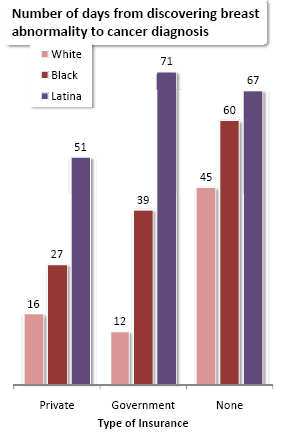Black women and Latinas are more likely to die from breast cancer than white women. This is, in part, because white women are more likely to have health insurance. New research, however, illustrated by Philip Cohen at Family Inequality, suggests that even we control for types of insurance and whether women are insured, black women and especially Latinas wait longer than white women for a diagnosis of cancer after the discovery of a breast abnormality:
The authors of the study, Heather Hoffman and colleagues, did not attempt to explain the cause of the disparity.
See also our posts on racial disparities in life expectancy for people with Down’s Syndrome, rates of asthma, and kidney failure.
Lisa Wade, PhD is an Associate Professor at Tulane University. She is the author of American Hookup, a book about college sexual culture; a textbook about gender; and a forthcoming introductory text: Terrible Magnificent Sociology. You can follow her on Twitter and Instagram.

Comments 9
Syd — November 23, 2010
It's interesting to note that not only do white women with government or NO insurance get treated faster than black and Latina women with private insurance, but that white women with government insurance get treated faster than white women with private insurance. I really have no idea what that may imply, but it is an interesting discrepancy.
Simone Lovelace — November 23, 2010
Particularly depressing since women of African descent are more likely to develop breast cancer to begin with.
Tracy — November 23, 2010
Could it be related to how those cultures view westernized medicine?
Erin — November 24, 2010
I wonder if this controlled for location? It seems like that would be a major factor intersecting with race.
JKBC — November 24, 2010
The data here is from the US; but it is similar to results from the UK, discussed in this article; http://www.bbc.co.uk/news/health-11492960, which removes health insurance from the equation somewhat.
Oldarney M.S. — November 27, 2010
I wonder if this counts the days after visiting the doctor, or after noticing the abnormality themselves.